Q: Are carnivorous plants autotrophic or heterotrophic?
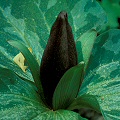 Trillium cuneatum:
Trillium cuneatum:
autotroph Primula tetranda:
Primula tetranda:
autotroph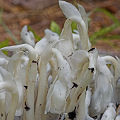 Monotropa uniflora:
Monotropa uniflora:
heterotroph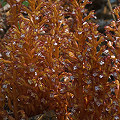 Corallorhiza maculata:
Corallorhiza maculata:
heterotroph
A: This is one of those specific, semi-technical questions that I get from time
to time which are clearly part of someone's science homework. If you fall
into this category, do not copy my answer verbatim. I assure you, your teacher
will catch you. (I bet you don't know about the international
teacher communication network, do you? I have a special pass to it that lets
me make sure you can't cheat on your homework and get away with it).
So when you complete your homework, answer in your own words!
Autotrophs
Life forms that can survive on simple molecules that are not
preprocessed by other life forms. Conventional (noncarnivorous) plants are
clearly autotrophs. They require water, CO2, light, and simple mineral nutrients
to survive.
Heterotrophs
Life forms that require complex organic molecules
that have been preprocessed by other life forms. Animals (and that includes
you) are all heterotrophs. Most bacteria are heterotrophs. Parasitic and
mycotrophic plants are heterotrophs.
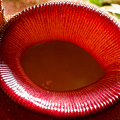 Nepenthes ampullaria:
Nepenthes ampullaria:
carnivore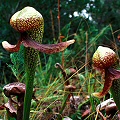 Darlingtonia californica:
Darlingtonia californica:
carnivore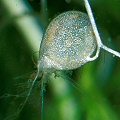 Utricularia ochroleuca:
Utricularia ochroleuca:
carnivore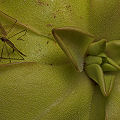 Pinguicula hemiepiphytica:
Pinguicula hemiepiphytica:
carnivore
What about carnivorous plants? They certainly benefit from gathering molecules
from other life forms, so that would seem to make them heterotrophs. On the
other hand, scientists have successfully grown carnivorous plants in laboratories where
the carnivorous plants were not given any insect food. I've even grown Venus flytraps in terraria for
two years without feeding them. In all these cases, the plants
grow perfectly well as complete autotrophs. Yes, they grew more slowly and produced
less seed than well-fed plants, but they survived and grew nonetheless. So while carnivorous plants may be considered
heterotrophic to a certain degree, for the most part they are autotrophic
just like other plants.
Recall, if you will, that perfectly normal autotrophic plants can be fertilized by adding pulverized animals to them? Don't believe
me? Then go to a plant nursery and gaze in horror upon bags of "bone meal" or "blood meal". Eeek!
If you are really interested in this business, here's a bit more for you... Generally speaking, we can classify organisms by how they obtain both the ENERGY
they need, and the nutrients such as CARBON. So you can get even more complicated by defining terms such as chemoheterotrophs, chemoautotrophs, photoheterotrophs,
and photoautotrophs. Also, if you REALLY want to get a good grade on your
assignment on autotrophs and heterotrophs, use words like "obligate" and "facultative" in
your report. Don't know what these words mean? Look them up!
Page citations: none (pick up any botany text book).